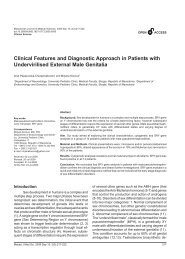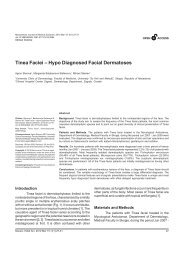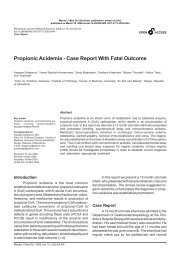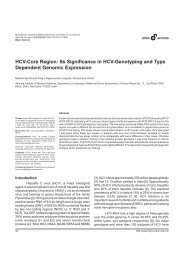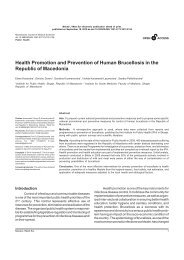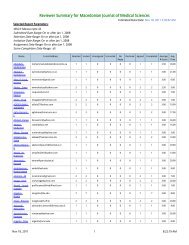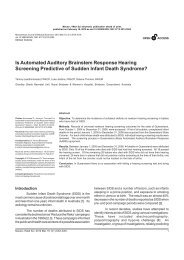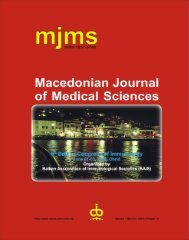Full text OnlineFirst (pdf) - Macedonian Journal of Medical Sciences
Full text OnlineFirst (pdf) - Macedonian Journal of Medical Sciences
Full text OnlineFirst (pdf) - Macedonian Journal of Medical Sciences
You also want an ePaper? Increase the reach of your titles
YUMPU automatically turns print PDFs into web optimized ePapers that Google loves.
Clinical Science<br />
decades [2, 3, 10]. Studies have shown that fear <strong>of</strong><br />
mastectomy, ignorance <strong>of</strong> the seriousness <strong>of</strong> painless<br />
breast lump, preference for traditional treatment, belief<br />
in spiritual healing and economic reasons are the main<br />
cause <strong>of</strong> late presentation <strong>of</strong> breast cancer patients in<br />
Nigeria and Ghana [11, 12]. Eighty two percent among<br />
breast cancer patients in our centre presented with<br />
advanced disease (Stages III & IV). This figure is higher<br />
than what was reported more than a decade ago when<br />
77% among breast cancer patients in Lagos presented<br />
in late stages [9]. Reports from other centres in Nigeria<br />
over the years showed that majority, ranging from 64%<br />
to 95% presented with late stages <strong>of</strong> the disease [2, 3,<br />
10, 13]. Fourteen percent had bilateral breast involvement<br />
at presentation in this study. Involvement <strong>of</strong> both breasts<br />
at presentation ranged from 1% to 9% in previous<br />
studies among breast cancer patients in Nigeria [3, 9,<br />
10, 13].<br />
Breast cancer awareness remains low among<br />
Nigerian women [14]. Patients continue to present late<br />
even when lesions are discovered early. Efforts by<br />
government and non-governmental agencies towards<br />
raising awareness and encouraging early presentation<br />
<strong>of</strong> the disease appear ineffective so far. Observed<br />
increase in the proportion <strong>of</strong> bilateral breast cancer at<br />
presentation in this study further reinforces this belief.<br />
Lagos has the largest concentration <strong>of</strong> both print and<br />
electronic media outfits used in breast cancer information<br />
dissemination in Nigeria. Furthermore, majority <strong>of</strong> the<br />
patients in the study are literate. All these do not appear<br />
to have made positive impact regarding breast cancer<br />
awareness. Communities have adopted different types<br />
<strong>of</strong> approaches towards achieving increased awareness<br />
about breast cancer. Individual–level interventions by<br />
written information, telephone counselling or interactive<br />
computer programme were tried but found to promote<br />
cancer awareness over short term only. There was no<br />
evidence that they promote early presentation with cancer<br />
symptoms [15]. However, community–level intervention<br />
through small group educational programmes, health<br />
promotion programmes in work places, health clubs and<br />
leisure centres was found to promote cancer awareness<br />
and presentation at an early stage [15]. There is need for<br />
studies aimed at identifying effective ways to achieve<br />
better awareness and early presentation <strong>of</strong> breast cancer<br />
patients in our community.<br />
Two-third among those diagnosed as having<br />
breast cancer eventually received treatment in our<br />
hospital. Simple mastectomy and level II axillary<br />
clearance were <strong>of</strong>fered to those whose lesions were still<br />
operable. None had breast conservation surgery. This is<br />
a reflection <strong>of</strong> the advanced nature <strong>of</strong> breast cancer in<br />
our patients. Few that presented with early stages were<br />
not considered for conservation surgery largely because<br />
<strong>of</strong> non-availability <strong>of</strong> radiotherapy facilities in our centre.<br />
Breast conservation surgery is currently the most popular<br />
treatment for breast cancer, representing 75 – 80% <strong>of</strong> all<br />
operations [16]. In patients presenting with large primary<br />
tumours, primary chemotherapy has been utilized to<br />
reduce the size <strong>of</strong> the tumour and make the lesion<br />
suitable for breast conservation surgery [16].<br />
Unfortunately, advanced stages at presentation and<br />
poor infrastructure for treatment <strong>of</strong> breast cancer have<br />
made this mode <strong>of</strong> surgical treatment less popular in<br />
many developing countries. None <strong>of</strong> the patients was<br />
<strong>of</strong>fered plastic surgery for breast reconstruction following<br />
mastectomy due to late presentation and the necessity<br />
for prolonged follow-up before the reconstructive<br />
procedure. Breast reconstruction after mastectomy for<br />
breast cancer has become a standard procedure. In a<br />
report, 42% among patients undergoing mastectomy<br />
had breast reconstruction with 95% being performed at<br />
the time <strong>of</strong> mastectomy [17]. Awareness about the<br />
availability <strong>of</strong> expertise and facilities for immediate breast<br />
reconstruction after mastectomy may encourage early<br />
presentation for treatment among our patients.<br />
All patients presenting for treatment had<br />
combination chemotherapy. This is an important<br />
component <strong>of</strong> breast cancer treatment and it is widely<br />
used in centres across Nigeria. One fifth among those<br />
<strong>of</strong>fered chemotherapy defaulted and did not complete<br />
the course. Non adherence to chemotherapy is a major<br />
challenge in breast cancer treatment especially in<br />
resource poor settings. Reasons for non-adherence<br />
include financial difficulty, relatively feeling well after<br />
commencement <strong>of</strong> chemotherapy, resorting to alternative<br />
treatment and drug side effects [18]. Only one-third<br />
among patients who were referred to the Radiotherapist<br />
reported to the oncology clinic after completion <strong>of</strong><br />
radiotherapy. Access to radiotherapy is a serious<br />
handicap to breast cancer treatment in developing<br />
countries. In Nigeria, a country with over 140 million<br />
inhabitants, there are only 5 functional radiotherapy<br />
centres. The high cost <strong>of</strong> this mode <strong>of</strong> treatment which is<br />
beyond what an average breast cancer patient can<br />
afford might have contributed to the non-compliance.<br />
Generally, high default rate was observed in this<br />
study. Thirty-three percent did not present for treatment<br />
after diagnosis was made while 48% among those that<br />
commenced treatment did not complete therapy. Default<br />
4<br />
http://www.mjms.ukim.edu.mk



